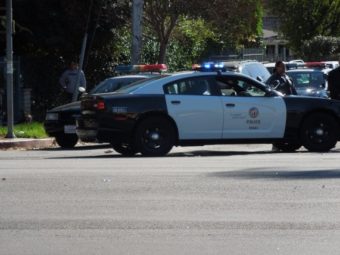
Recently a friend who is a campus safety director was relating their ongoing struggle to convince administrators his department needs to become a full service public safety department. I asked what the obstacle was. They said, “It’s always the same argument. “What is wrong with calling the local police department? It’s always been good enough in the past.” When dealing with the challenges of providing public safety services to complex communities, what worked in the past may have limited value in the future. There are many compelling reasons for protecting your campus with your own full service public safety department. Here are five issues that should be considered.
Operational Capability
Full service public safety departments work every day on their campuses. They know the community members, the challenges, and understand how to solve problems in the higher education environment. Your local police must prioritize calls for service. What is a major safety problem on your campus is just another item in a list of growing priorities. Problems such as homelessness, public intoxication, and property thefts are a sample of issues that can disrupt an educational community. Most municipal police departments are now focusing on serious threats to personal safety and have limited resources to deal with less serious threats.
Another issue is information sharing and operational planning. Campus security departments do not have the access to sensitive information reserved for peace officers. This is the state law in most states. Your local police department and other law enforcement agencies cannot share information about suspects or threats that are considered law enforcement sensitive information. Some cities will not allow non-public safety departments to monitor or communicate with them by radio. Some campuses have first learned of a critical incident when they see emergency vehicles driving with lights and sirens across campus.
A typical operational problem involves dealing with missing persons. Local police departments with daily backlogs of 911 calls do not have much time to look for a missing student or staff member. If your security department has information such as a license plate or the name of a person who may have information they have no access to law enforcement only data bases like department of motor vehicle records. This vital information can sit untapped while witting for the local police.
Problems that can be quickly solved by a full service public safety department often must wait for the availability of the local police to respond. A good example are persons suffering from some type of mental or stress episode. A 2013 study by the American College Health Association estimates 57% of female and 40% of male students reported episodes of “overwhelming anxiety.” These often result in the need for public safety officers. Campus security departments do not have the legal authority to immediately get the help available to peace officers through state health and welfare statutes.
Training is another huge issue. If your public safety officers are peace officers they are eligible to attend a wide variety of free training and education provided by the state and federal government. This is not available to non-peace officers.
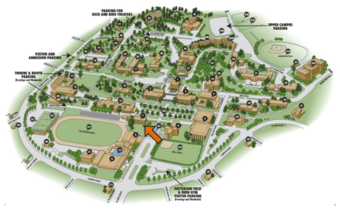
If you set aside non-emergency calls the operational capability of local police departments can also be problematic. One of the biggest challenges is their lack of geographic familiarity. Your local police officers may have no idea of where individual buildings or facilities are located on campus. The first time they are on your campus maybe a life threatening emergency when seconds count. Instead of responding they are stopped at an information kiosk asking for directions.
Cultural and Community Awareness
Different communities have differing expectations regarding the type of public safety service they expect. Few communities are as complex with so many interests and unique stakeholders as a college or university. Providing public safety services to this spectrum of interests and beliefs requires a public safety department that is part of the community. This means direct engagement. Direct engagement means spending time in the community and resolving problems to accommodate the culture. The result is trust in the people providing the public safety services. This level of trust is impossible to fabricate in a single community police forum.
In the past ten years the approach to discipline and campus investigations of misconduct has rapidly evolved. These procedural changes mean a campus public safety department is constantly balancing a variety of requirements and policies which change with every new “Dear Colleague” letter from the US Department of Education and the Office for Civil Rights. Local police departments do not have the expertise, personnel, or time to engage in this process of change.
For most local police departments the challenge always is shrinking budgets and increasing service demands. This means fewer cops to deal with increasing problems. If your astronomy department wants to talk about protecting students engaged in a night time research project your campus public safety department has the time and interest to engage. Your local police department may have to decide between your astronomy meeting or assigning officers to staff a homeless support/enforcement unit as required in a new state law.
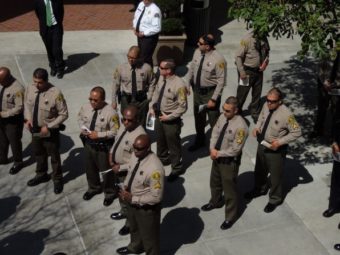
One of the greatest challenges to campus cultural awareness and the local police department is the dynamic nature of police management. I have participated in introductory meetings between campus officials and the local police agency. The first step by the local police is to assign a member of the police department to serve as the liaison with the campus. Six months later I ask how it is going. Typically the person who was assigned did a great job until they were promoted and moved to a new assignment in traffic. No one has met the replacement because they are at a six week community relations course at the state police academy. The constant reassignment of local police personnel means there is very little personnel continuity critical to developing campus expertise as well as cultural and community awareness.
The local police have to answer to a wide variety of community stakeholders of which your campus is only one. When they are under increasing pressure for service their time and resources to improve campus cultural awareness are limited. Having your own full service public safety department means you can have this expertise and support available throughout your campus community. Local police officers have no training or background in issues related to Clery, Title IX, or the many other higher education specific issues that are critical to campus safety.
Quality of Service
Quality of service is often an issue when dealing with local police departments. With my 27 years of experience in higher education and municipal policing the problem was always priorities. Public safety budgets are routine targets because of their size. This means fewer cops and fire fighters/paramedics to handle more calls for service. These departments are often under pressure to lower response times. Focusing on lower response times does not lend itself to the quality of service you want for your campus.
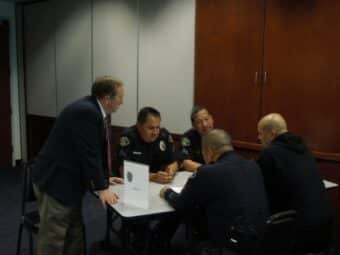
Care for Your Employees
An issue that is often overlooked is the care of your campus security employees. I have been asked to provide expertise to higher education institutions considering the transition to full service public safety departments. Part of this involves speaking with administrators. I always ask them what they expect their security officers to do in a variety of situations. They typically say they want their officers to respond, observe, and if necessary call the local police.
There is a huge problem that persons who have never been in the position of a police or security officer cannot understand. This is the dilemma of the unknown. Police officers responding to an unknown trouble call often discover what seemed to be routine has turned into a dangerous confrontation. Saying your security officers should just respond and evaluate is based on the faulty notion they will always have enough time and situational control to call for help.
In 27 years of police work the most dangerous incidents I handled started out as routine. I was nearly killed responding on a call to a local motel for a guest who refused to check out. As we walked up to the room he opened fire from inside. It turned out he was suicidal and waiting for the hotel to call the police so we could shoot him. Campus security officers being dispatched to calls in the middle of the night have no idea what they may confront.
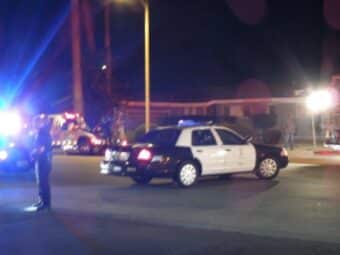
The FBI has concluded that many active shooter incidents last less than seven minutes. You must evaluate the realistic response time for your local police department. This means responding to your campus and finding the specific location against their average response times for emergencies. When evaluating the time you must recognize the published response times are to locations in the city where police routinely respond. Not someplace on your campus they have never heard of.
Having your own public safety department can dramatically cut the incident response time. The 2014 active shooter study by the Police Executive Research Forum disputed the theory that single officer responses were ineffective. The study concluded that a single officer can neutralize a killer and prevent additional killings. Every minute you are waiting for your local police department to arrive on campus can mean lost lives.
Summary
Relying on a local police department can often seem a simple and cost effective alternative to a full service public safety department. Local police departments lack the familiarity to the campus community and culture. They must prioritize their services with the greater community and not just focus on your campus. Their resource limitations often result in less than satisfactory service responses. Local police departments do not have the expertise needed to deal with complex investigative and procedural processes unique to higher education. Finally, if you have an active shooter incident seconds will become critical when lives are at risk. I believe having a full service public safety department will provide your campus the greatest level of safety and most responsive effort of safety engagement.
